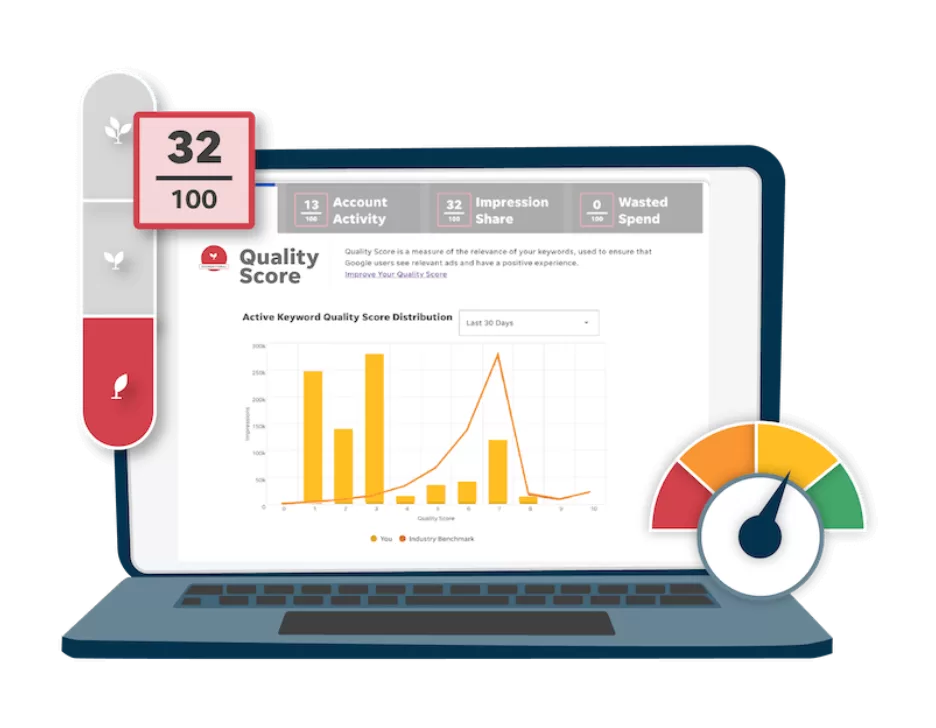E-A-T was a hot topic mentioned on multiple SEO blogs back in 2018. Despite the community exploring this topic, little concrete information is known about it, and even more rumors and hearsay were repeated as if they were facts.
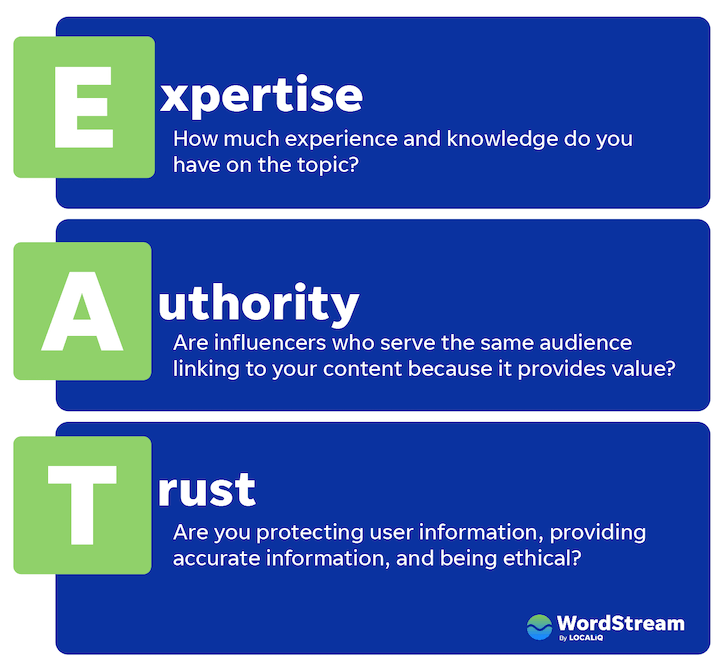
There’s even less information about the exact steps for improving the website’s E-A-T are available to beginners, after all this isn’t a KPI you can easily track. This article will bring together what’s known about E-A-T to answer your FAQs about the concept and suggest practical ways of improving it.Did you hear: Google added another “E” to E-A-T! Find out all about Google E-E-A-T here.
1. What is Google E-A-T?
E-A-T, which stands for Expertise, Authoritativeness, and Trustworthiness, is not an update or an algorithm. It’s a principle.
- Expertise: How much experience and knowledge do you have on the topic?
- Authority: Are influencers who serve the same audience linking to your content because it provides value?
- Trust: Are you protecting user information, providing accurate information, and being ethical?
It first appeared in Google’s Search Quality Rating Guidelines as an extremely important rating factor for employees. The concept of judging website and content expertise and authority has been in the works in Google much earlier than that. That’s clearly evidenced by the introduction of rel=author tag that was later dropped in 2014.
Since the Google Core Update of 2018, there have plenty of articles on E-A-T, but a lot of them just repeated expert opinions instead of looking for evidence. As a digital marketer, you must understand that Google wouldn’t publicly disclose how the algorithms work. This article can’t give you a recipe for success, unfortunately.
It will, however, give you a series of educated, evidence-based guesses, and case studies wherever possible.
2. Is E-A-T a ranking factor?
The most important question is whether E-A-T is a ranking factor. Answering this question is harder than you may think.
Google’s Gary Illyes said in his 2019 Q&A with Marie Haynes that Google does not have an internal E-A-T score. That’s why some sources later claimed E-A-T is becoming irrelevant.
In the same interview, he added that increasing E-A-T is a good thing. He also said that E-A-T is conceptualized by several algorithms.
What’s the big takeaway here? There’s no single Google algorithm or update that focuses on E-A-T as a ranking factor. Nor is E-A-T the leading ranking factor after the 2018 Core Update.
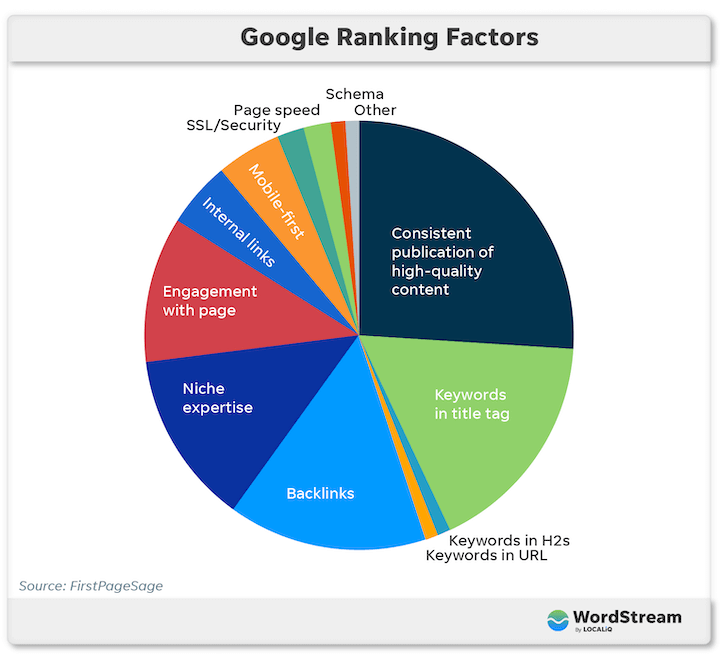
However, multiple algorithms track and assess expertise, authority, and trust of pages, websites, and authors. These factors may have a more profound effect on YMYL websites like news sites or medical sites, but it’s unlikely they would be completely disregarded in assessing the quality of other pages.
Another big piece of evidence towards the E-A-T principles being a major factor is how much space is given to them in the Search Quality Rater Guidelines. This is a document for Google’s employees who manually check and rate website quality in SERP.
These raters, as Google Webmaster Central Blog outlines, do not impact ranking directly, but are checking on how well the algorithms are doing their job. This means that E-A-T is an important factor and Google does intend their algorithms to work this way.
So much so, in fact, that these guidelines give a whole chapter to assessing E-A-T—56 out of 175 pages. The document also states that E-A-T is one of the most important factors in determining the overall quality of a page.
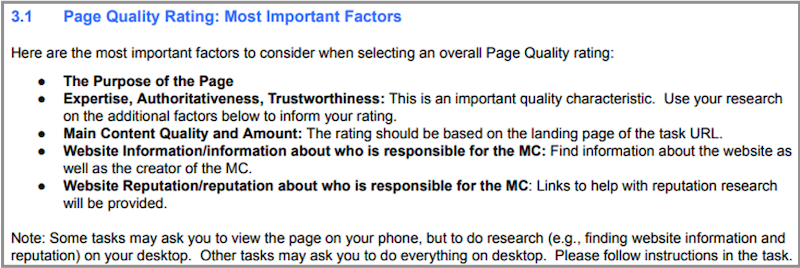
Also, Google’s own explanation of how search engines work clearly states that expertise of sources is among ranking factors.
That said, it’s highly unlikely that Google suddenly shifted its focus from discovering links and measuring behavioral factors to E-A-T as its primary ranking signal. It’s safe to assume that expertise, authoritativeness, and trustworthiness are complementary factors that matter more in some searches and less in others. But they do matter.
3. Is Google E-A-T only relevant for YMYL websites?
One of the major reasons behind Google’s new emphasis on expertise and authority is giving the user the most accurate information on YMYL websites. YMYL, Your Money or Your Life, are websites and businesses that can significantly influence either your life or your wallet. Here are some examples of YMYL topics:
- News
- Legal advice
- Finance
- Medical advice
- Online shopping
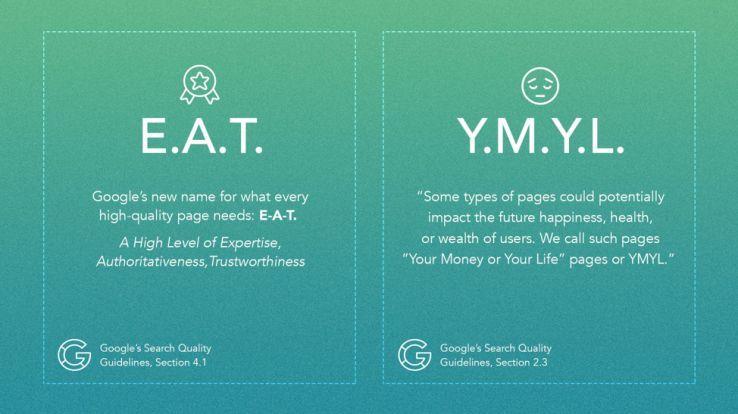
There’s no question of whether you need to consider E-A-T if you own a website with such content. But do you need to lean heavily into increasing authoritativeness if your website doesn’t fall into that category?
There’s no concrete evidence here except for this passage in the Search Quality Raters Guidelines:

Judging from this, expertise matters in all topics. However, it’s safe to assume that E-A-T would be much more important in YMYL topics.
4. Does author reputation affect ranking?
Google algorithms are probably considering website expertise and authority as an important factor. But do they also consider the reputation of the author? From the way the SQRG document talks about assessing the quality of a page, it seems they would:

To be considered high-quality, a page needs to have a satisfying amount of high quality of main content (MC), and have a positive reputation. This document also lists the author’s E-A-T as an important factor.
Gary Illyes also confirmed that Google algorithms create entities for reputable authors. As Marie Haynes quotes him, “If you’re an executive for WaPo, you have an entity.” It’s not clear how exactly that entity is created, but we can be certain that the algorithm “knows” high-authority authors.
The question now is how much of media attention should an author get to get recognized by the search engine. If you’re not a top contributor to Forbes, should you even try to establish a reputation or it’s too much work?
The answer is nobody knows. However, some evidence suggests that every bit of expertise and authority helps. Remember that the Search Quality Raters Guidelines explicitly say expertise matters in every field. Here’s how this document guides raters to find reputation information:

For websites, the raters should do a series of search queries like these:

The point here is to find any mentions of the website or author on the web that’s not created by them personally. Later, the document comments on how to find reputation information on authors: “…look for biographical data and other sources that are not written by the individual.”
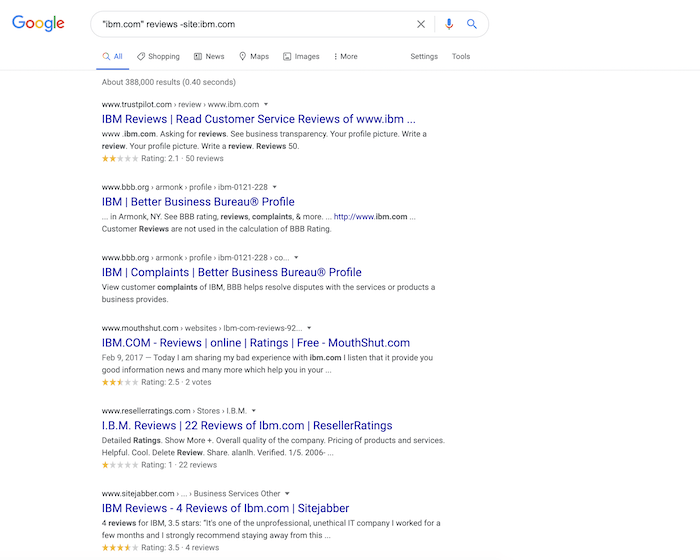
As a piece of supporting evidence, here are a few searches from the WordStream blog. This SEO-oriented blog supports guest blogging and has articles written by anonymous authors and by authors with authority in the field.
Out of the pages you see in the screenshot below, none are written anonymously.
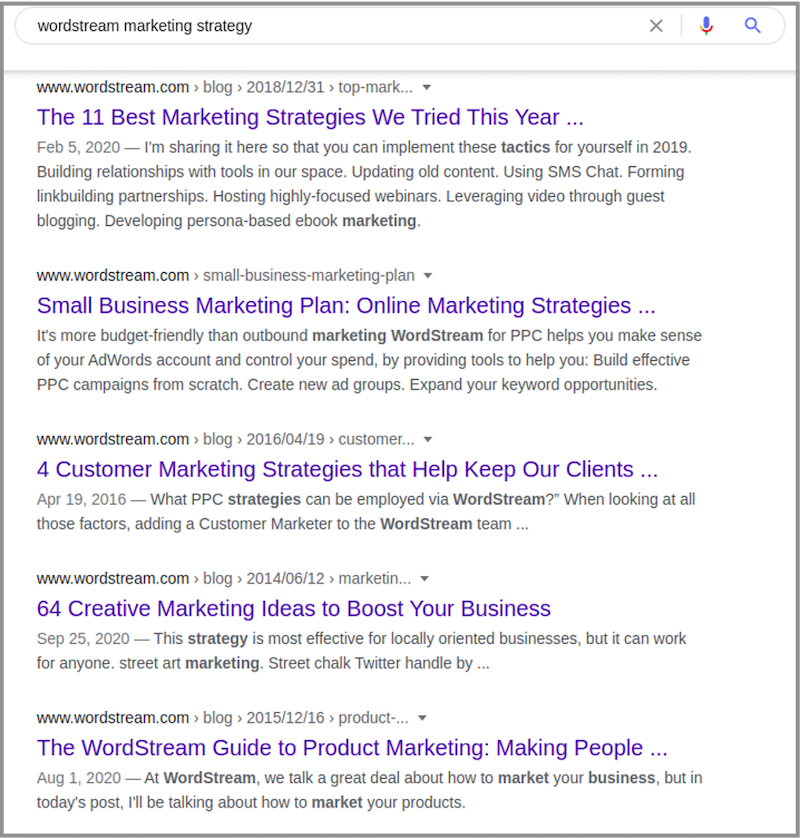
Out of these three, only the lowest-rating one was written by an anonymous author. The top two pages were written by expert writers.
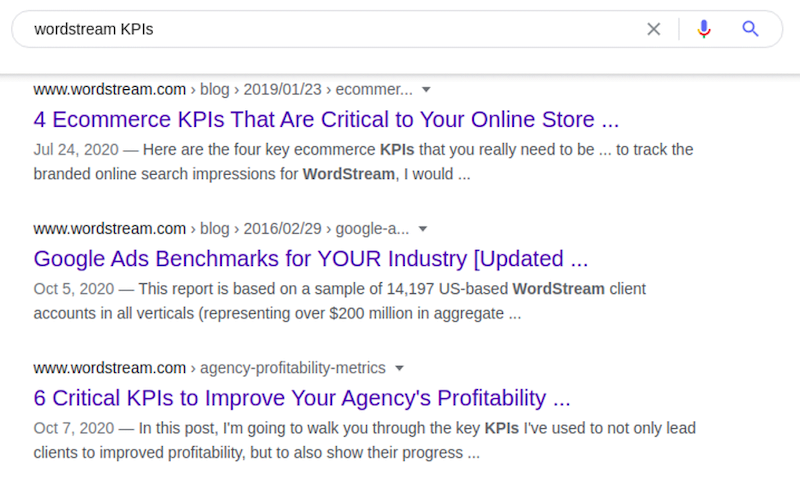
This is not concrete evidence since Google has well over 200 ranking signals, but it does support the information from the SQRG. It would be safe to assume that an author’s E-A-T does influence ranking, but it’s unclear to what degree.
5. How can you leverage author expertise for SEO?
The biggest impact you can gather from Google recognizing author expertise as a ranking factor is to become a contributor for Forbes or Business Insider. However, it’s not feasible for most small and medium businesses.
One of the first things you could do is become a contributor to smaller publications. Make sure you choose blogs that have authority and create great content to establish yourself as an expert.
This won’t give you instant credibility like contributing to WaPo and the likes would, but it still counts. James Parsons, founder of Content Powered, delivers a great tip: if you want even smaller blogs to count, find editors of big publications you’re aiming to end up in and see what small blogs they follow. Then contribute to these blogs for a better chance of being noticed.
The other thing is to get an author with high authority to write for your blog. Authors who write for expert publications in your field may be the thing you need to get to the top page of Google search results.
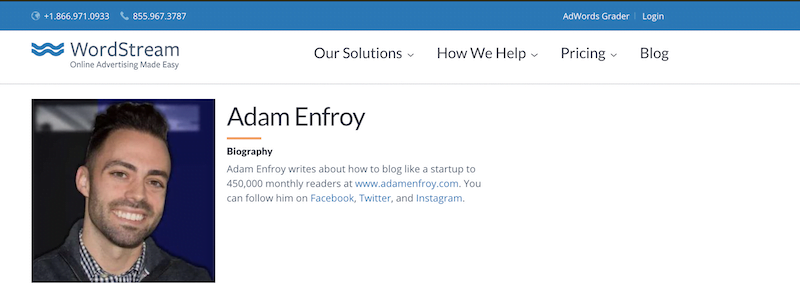
The last one is getting your name mentioned. As stated in the SQRG above, the raters should look for mentions of the website or the author’s alias in sources that were not created by them. This gives more credibility to their reputation than what they themselves write, naturally.
One way to do that is to create profiles on websites of expert societies. The other, more important one, is to grow your connection network and to get quoted.
You can start with registering on HARO to give authors expert information in an exchange for a mention, or reach out to prominent authors in your field. If you have information or opinions that are relevant to their content, you may get mentioned, growing your expertise.
To sum this all up, it’s unclear how exactly Google’s algorithms and employees see individual authority. But if your or your author’s names can be found on Google, you’re probably on the right track.
6. How does content expertise affect ranking?
It’s a well-known fact that content is king these days. In fact, that is known since Bill Gates said it back in 1996. But we’re not here to debate whether your website needs great content — it does. The question we will try to answer is whether content quality affects ranking through E-A-T.
Judging from the search quality rater guidelines, there’s more to a good piece of content than keyword density and behavioral signals. Here’s what a good page looks like, according to SQRG.

Now, some of these factors may be influenced by user behavior. For instance, Google’s algorithm may believe a page with a high bounce rate to be non-relevant or a page that gets shared on social media a lot as relevant.
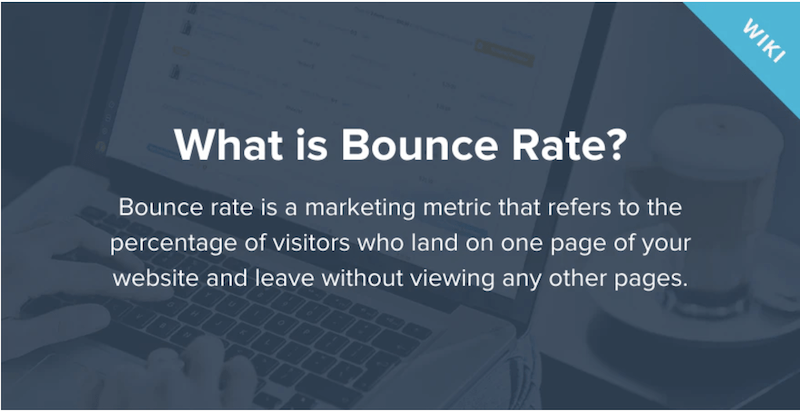
It’s unclear how exactly Google would automatically check that page content is accurate, comprehensive, and clearly communicated. The company certainly wants it to be all of that so it’s probably what you should strive for.
7. How can you leverage content E-A-T for SEO?
There are a couple of things you can do to make your content more in line with E-A-T guidelines.
The most basic thing you can do is to make sure the main content of the website matches the main content of the page. For example, a page with financial advice on an SEO-oriented website would probably not meet E-A-T guidelines.
Secondly, stick to long content if you want the page to rank higher. It explicitly says so in the search quality rater guidelines.

On top of that, there’s a lot of evidence that suggests long-form content ranks higher.
The third point is to focus on quality instead of quantity. Andrew Gloyns describes in this case study that his website’s pages grew in SERP after he merged several underperforming pages into few high-performing ones.
One of the key things Andrew did is utilize the skyscraper technique. He doesn’t say so explicitly, but his approach is essentially very similar. Here’s what he did and what you should do:
- Find every bit of information a user wants to see on a certain query
- Write about aspects that the competition misses
- Explain each bit with as much expertise as you can
- Segment the content accordingly, with clear headlines
- Regularly update the page
- Cite the authoritative sources
All of that proved useful for Andrew and his content pieces grew in ranking. He also didn’t leverage author E-A-T in this case study so the results rely on content E-A-T only.
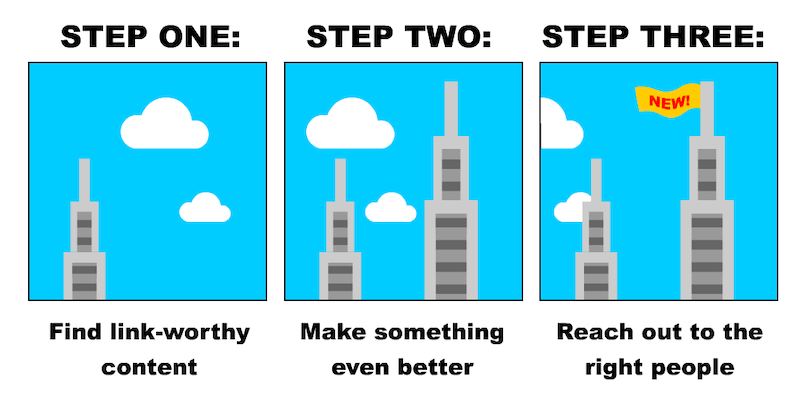
Citing sources that have authority in the eyes of Google is another tactic you may use. How useful it can be is dubious, though. SQRG does not explicitly mention that outbound links to authoritative websites increase E-A-T, it does mention the content needs to be well-researched. It’s not a far reach to think outgoing links to Wikipedia, scientific articles, or other sources would indicate the author did their research.
Some experts claim that outbound links improve SEO, but most of it is just advice from the experts. One of the few studies that may prove linking to sources is a good practice is this one carried out by Shai Aharony of Reboot Online. The study compares how fresh websites with and without outbound links rank compared each other. The ones that do have links consistently rank higher.
That said, outbound links are probably a very minor factor and you shouldn’t go out of your way to leave links. If you write well-researched content and give credit to your sources, this should be enough.
Bottom line: incorporate Google E-A-T into your marketing strategy
To conclude this, you should definitely pay attention to expertise, authoritativeness, and trustworthiness, but keep in mind that these are not the only ranking signals. Instead of treating E-A-T as the new main metric in your arsenal, simply incorporate it into your content marketing strategy.
These guidelines are extremely important for YMYL websites, but if yours doesn’t fit in that category, you should consider improving E-A-T as well. Here are the main steps:
- Improve your and your staff writers’ authoritativeness in Google’s eyes
- Invite well-known authors to write for your blog
- Focus on long-form content with high likelihood of ranking in top 10
- Do your research well and cite the sources
E-A-T does matter a lot for individual pages, but do not forget that the overall website quality is one of the main factors as well. Make sure you work on that as well — create an “about us” page, post T&C and privacy policy, get your website mentioned on high-authority websites, do keyword research, etc.
And most importantly, never stop learning and write well.

